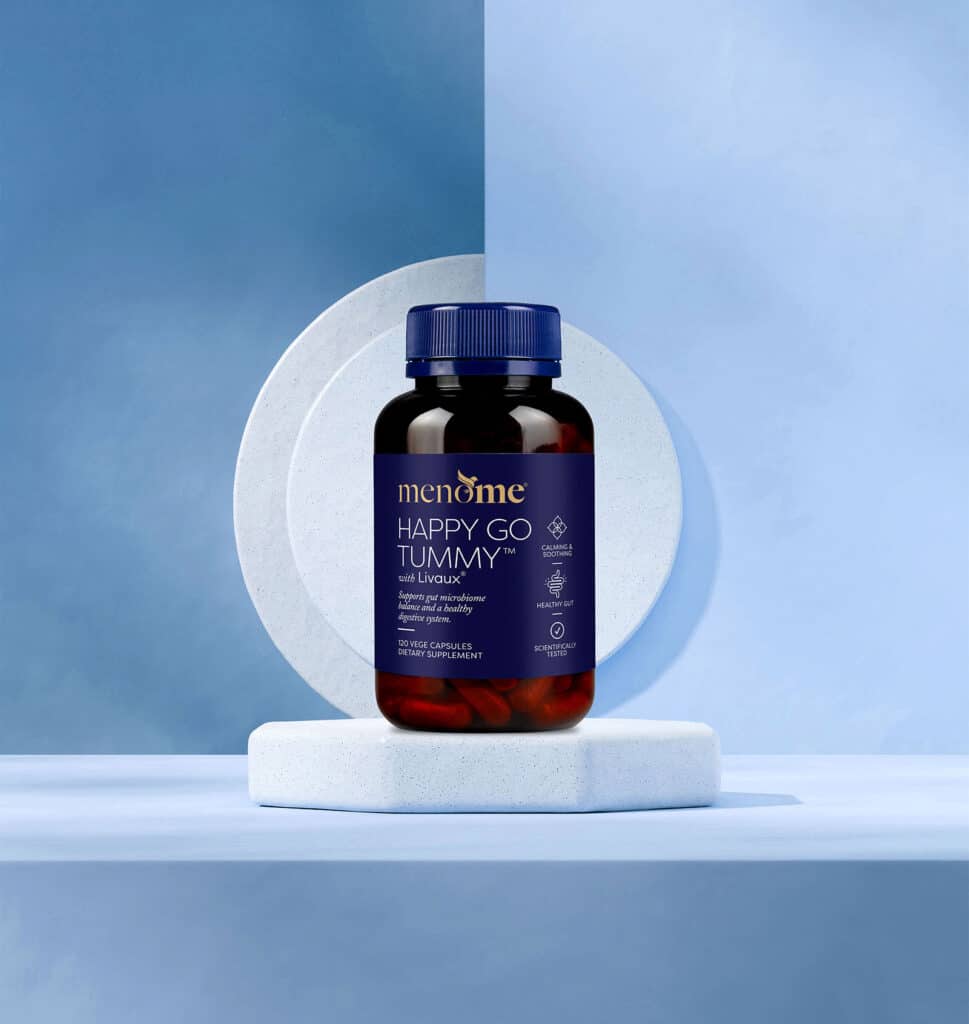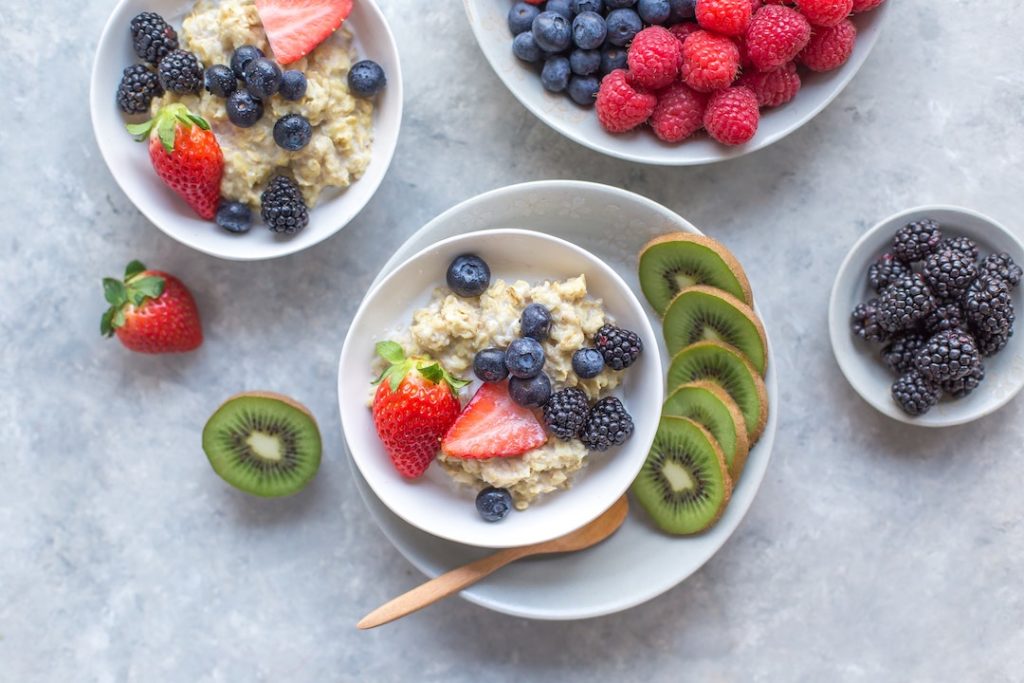Food really is powerful when it comes to navigating your peri menopause journey.
Whether you’re in peri or post-menopause, what you eat can make a big difference to how you feel.
Indeed, certain foods may support healthy weight management (don’t we love that?!) and ease digestive niggles like gas, bloating and constipation. Other foods? They can trigger the not-so-fun stuff – think hot flushes, mood swings and insomnia. Enter oats.
Why we’re oat obsessed
Wholegrain rolled oats(1) – the whole unprocessed kind – are a superstar in a menopause-friendly diet. They love your gut and heart, help balance blood sugar, boost energy and keep you feeling full and satisfied for longer(2). That’s winning we say! 💙

In addition, oats are an excellent source of soluble fibre – a true gut health hero. Soluble fibre feeds your good gut bacteria and supports a healthy colon, which is essential during every stage of menopause.
Even better? Oats are packed with antioxidants and the all-important B vitamins, both of which help the body manage stress, support energy production, and reduce inflammation.
All of this makes oats a fabulous ally in minimising menopause triggers like weight gain, bloating, and low energy – not to mention giving your overall health a boost. 💙
NB: A quick word on carbs (they’re not the enemy!)
A balanced diet needs all three macronutrients: protein, fat and carbohydrates. Carbs are you body’s preferred source of energy. If you don’t get enough, your body may start using protein as fuel instead – robbing your muscles and bones of what they need. That’s a big deal for midlife women, especially with the increase risk of sarcopenia (muscle loss) and osteoporosis.
So let’s be clear. When we talk about limiting carbs, we mean the refined, processed kind – think white breads, sugary snacks, and instant noodles.
Wholegrain oats, on the other hand, are an unrefined carbohydrate – nutrient-dense, slow-burning and ideal for most people.

Overnight Oats
We’re big fans because they’re simple, satisfying, and oh-so-convenient. Make a big batch at the start of the week, pop it in the fridge, and you’re sorted.
You can keep it plain and jazz it up with toppings each day, or mix in goodies like chia and flaxseeds right from the start.
Overnight oats are endlessly customisable and the perfect accompaniment to other menopause-magical foods like nuts and seeds (good fats, proteins, omega-3 essential fatty acids) and fruit like bananas, berries and kiwifruit (antioxidants and fibre).
Mix them up in a big bowl and scoop them into traditional bowls daily or go fancy and layer them into glasses and jars for a grab -and-go option that looks as good as it tastes!
Ingredients
Serves 4
(If you wish to make a single serving simply quarter the amounts.)
- 2 C old fashioned whole grain rolled oats
- 2 C almond/soy milk (or your milk of choice)
- 1 C coconut yoghurt if you’d like it extra creamy (or Greek yoghurt if you’re not sensitive to dairy)
- ¼ tsp cinnamon (great for blood sugar stability)
- A dash of natural vanilla extract
- A pinch of sea salt
Optional:
- ¼ C chia seeds – they will drink up liquid so gauge your needs ( gut-loving fibre, omega 3, protein)
- ¼ pumpkin/sunflower/hemp and or flax seeds (zinc, protein, omega 3)
- ¼ C coconut flakes
- 2-3 chopped apricots/dates or figs
Toppings to try:
- Berries
- Kiwifruit
- Banana
- Walnuts
- Coconut Flakes
- Walnuts
- Brazil nuts (chopped)
Tip: 1-2 Brazil nuts supply you with your daily requirement for selenium which is essential for thyroid health – vital in midlife.
Method:
- Use a large bowl and add all of the main ingredients to it.
- Either leave in the bowl or transfer to individual bowls and glasses.
- Cover and leave on the counter or put in the fridge overnight.
- If you’ve used the bowl, spoon them into bowls or glasses when you’re ready to eat.
- Top with your garnish of choice.
Enjoy!
NB: Oats contain avenin which is a protein that acts similar to gluten. Avenin is generally well tolerated even in people who have gluten intolerance or coeliac disease. If you are a coeliac check with your doctor.
Notes:
Menopause & digestion: what’s really going on?
Our digestive system is pretty miraculous. Along with the microbiome (aka your gut’s good bugs), it works hard to break down food, absorb nutrients, and move waste out of the body with help from fibre.
But during menopause, this natural rhythm can get a little…off track.
As estrogen levels drop and cortisol (the stress hormone) rises, several changes can impact digestion. Research shows that menopause may reduce stomach acid (HCL) and microbiota diversity, which can make your gut more sensitive than it used to be.
That’s why foods you’ve always tolerated – like dairy, gluten, meat or refined carbs – can suddenly cause bloating, gas, constipation, or even contribute to weight gain.
Cortisol & the gut: what stress has to do with it
Estrogen helps keep cortisol in check. So when estrogen declines, cortisol can rise more easily – especially when life feels full-on (and let’s be honest, it often does in midlife!)
Cortisol’s job is to manage how we respond to stress. When it senses a threat – whether it’s an actual emergency or just another overflowing inbox – it kicks the body into “fight or flight” mode.
What’s more it:
- Releases glucose into the bloodstream for quick energy
- Prioritises survival functions (like alertness and muscle strength)
- Downregulates digestion and reproductive functions
That means digestion slows down, and your body may not process food as efficiently.
This can lead to:
- Sluggish gut motility (food moves more slowly through the system)
- Digestive discomfort (bloating, flatulence, constipation)
- Increased sensitivity to certain foods
- Higher likelihood of storing fat – especially around the belly
The bottom line
What can you do?
Minimise stress as much as (humanly) possible and follow the PPFF rule.
PPFF stands for phytoestrogens, protein, (healthy) fat and fibre. Ensure you get plenty of these daily and you’ll be ahead of the menopause game.
- Read more about PPFF in 5 Ways Your Diet Should Change As You Enter Perimenopause.
- Get your copy of our FREE phytoestrogens food list here.
- Consider giving your digestive system a helping hand with Happy Go Tummy® which is a combination pre- and probiotic.
Please note: Certain medical conditions such as liver and bowel disease, diverticulitis and some cancers can manifest in a similar way to menopausal digestive issues. If you are having frequent and persistent problems it’s important that you see your GP or gastroenterologist

References
- Rasane P, Jha A, Sabikhi L, Kumar A, Unnikrishnan VS. Nutritional advantages of oats and opportunities for its processing as value added foods – a review. J Food Sci Technol. 2015 Feb;52(2):662-75. doi: 10.1007/s13197-013-1072-1. Epub 2013 Jun 25. PMID: 25694675; PMCID: PMC4325078.
- Rebello CJ, Johnson WD, Martin CK, Han H, Chu YF, Bordenave N, van Klinken BJ, O’Shea M, Greenway FL. Instant Oatmeal Increases Satiety and Reduces Energy Intake Compared to a Ready-to-Eat Oat-Based Breakfast Cereal: A Randomized Crossover Trial. J Am Coll Nutr. 2016;35(1):41-9. doi: 10.1080/07315724.2015.1032442. Epub 2015 Aug 14. PMID: 26273900; PMCID: PMC4674378.
- Becker SL, Manson JE. Menopause, the gut microbiome, and weight gain: correlation or causation? Menopause. 2020 Nov 23;28(3):327-331. doi: 10.1097/GME.0000000000001702. PMID: 33235036.
Photo by Melissa Belanger from Unplash
Just so you know: this article is written by a real person who has studied the physiology of menopause and women’s healthy ageing. While we may use AI as an assistant, the research, insights and heart behind every piece comes from us.









